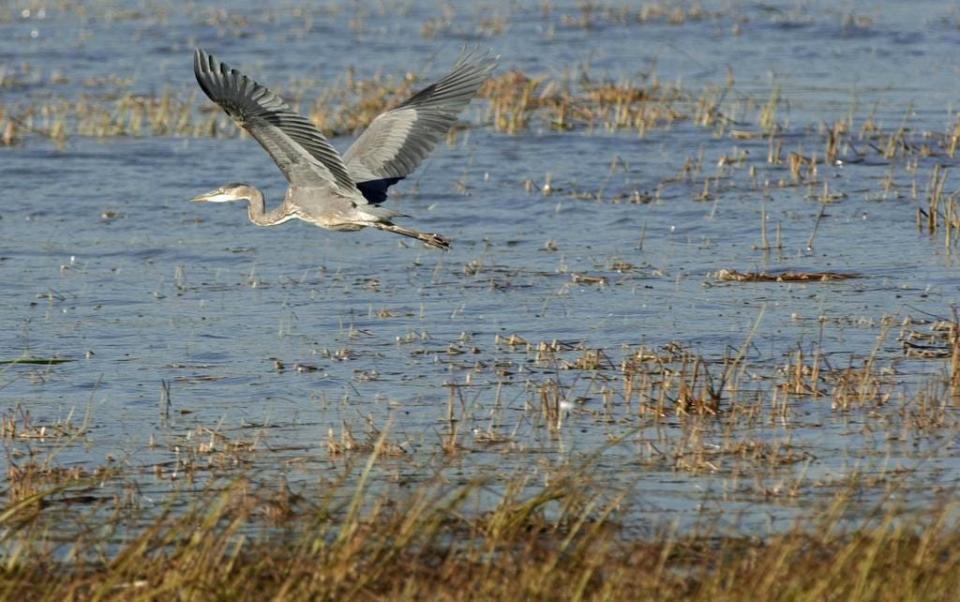What the Supreme Court’s decision on the Clean Water Act means for Michigan wetlands
- Oops!Something went wrong.Please try again later.
NORTHERN MICHIGAN — The United States Supreme Court recently handed down a decision limiting the landmark 1972 Clean Water Act, and Michiganders want to know how this will affect their wetlands.
On May 25, the Supreme Court delivered a 5-to-4 ruling significantly curtailing the authority of the Environmental Protection Agency to regulate the country’s wetlands via the Clean Water Act (CWA). The court’s conservative majority used a challenge brought against the CWA by Idaho property owners Michael and Chantell Sackett to roll back a 51-year-old federal rule outlining protections for wetlands that do not have a surface connection to other streams, oceans, rivers and lakes.
According to the environmental group Earth Justice, the ruling removes as much as 118 million acres of wetlands from federal protection.
Writing for the court’s majority, Justice Samuel Alito authored the opinion that only wetlands with a surface connection to other bodies of water should fall under CWA protection. Critics of Alito’s opinion say it is overly simplistic and does not consider the full scope of wetlands. For example, Alito’s opinion does not account for wetlands that may not share a surface connection with other waterways but which do share groundwater connections. The opinion also does not consider wetlands that may have a “significant nexus” to other waterways or wetlands that expand and recede based on the season, all classifications that the CWA once protected.
Justice Brett Kavanaugh, who joined with the court’s three liberal members in dissenting from the ruling, disputed Alito’s opinion, saying the ruling would have “significant repercussions for water quality and flood control throughout the United States.”
Justice Elena Kagan also authored a dissenting opinion, saying the SCOTUS majority was appointing itself, instead of Congress, as the “national policymaker on the environment.”
Former EPA administrators also criticized the decision.
The ruling is a “major blow to the landmark Clean Water Act and the federal government’s ability to protect our people from pollution and its negative health side effects,” said Carol Browner, who served as EPA administrator in the Obama Administration.
Environmental groups also decried the decision.
“I don’t think it’s an overstatement to say it’s catastrophic for the Clean Water Act,” said Jim Murphy of the National Wildlife Federation. “They (wetlands) are really the kidneys of water systems and they’re also the sponges. They absorb a lot of water on the landscape. So they’re very important water features and they’re very important to the quality of the water that we drink, swim, fish, boat and recreate in.”
Subscribe: Check out our offers and read the local news that matters to you

Michigan has more than 11,000 lakes and ponds, 36,000 miles of streams, 3,288 linear miles of coastline, and approximately 6,465,109 acres of wetlands. These wetlands provide habitat for thousands of species of aquatic and terrestrial plants and animals, supporting critical biodiversity that all life depends on. Such lands also provide valuable flood protection, improve water quality, reduce shoreline erosion, protect clean drinking water and provide recreation opportunities for Michigan residents and visitors.
Since the SCOTUS decision in May, Michiganders have wondered how it will affect their state.
Michigan’s wetlands are currently shielded from the decision simply because Michigan’s state laws provide more comprehensive protections than the baseline protections outlined by the federal government. For example, Michigan is just one of three states authorized by the EPA to run its own wetlands development permitting program, and the laws enacted by the Great Lakes State for that program go beyond the protections outlined in the CWA.
“We’re in a lot better shape than the vast majority of states,” said Nick Schroeck, an environmental law professor at the University of Detroit Mercy. “The state has its own definition of wetlands and its own jurisdiction for wetlands. Even post-Sackett, with changes in federal jurisdiction over what constitutes wetlands from a federal perspective, in Michigan we still have a lot of wetlands that are protected by state law.”
Unlike the severe drawbacks to the CWA outlined in Justice Alito’s opinion, Michigan state law still protects wetlands connected to an inland waterbody, connected to one of the Great Lakes, or within 500 feet of an inland waterbody. That means a vast amount of wetland acreage in the state is protected and will remain so despite the SCOTUS ruling.
However, even with Michigan’s additional buffer of protections, wetlands are still being reduced in the state.
“We’re still gobbling them up,” said Schroeck. “Certainly, in Southeast Michigan, we’ve lost the vast majority of our wetlands. Even with these programs in place, it’s not like we’re stopping the slow progression of destroying naturally-occurring wetlands in Michigan.”
In 2014, the then-Michigan Department of Environmental Quality published a report outlining the decline of wetlands in Michigan from pre-European settlement to the 21st century. According to that report, Michigan contained approximately 10.7 million wetland acres before European settlement. Michigan has just over 6.4 million wetland acres today, a 40 percent loss. Since the passage of Michigan’s wetland protection law in 1979, the rate of wetland loss has declined. However, the state still loses about 1,157 wetland acres per year.
Though Michigan laws currently protect wetlands at a higher level than federal regulations, environmental law experts worry that changes at the federal level mean a reduction in the nation’s broader oversight layer. This reduction could trickle down and lead states to reduce their environmental protections. Already, several states have adopted the minimal wetland protections outlined in federal regulation.
Ren Brabenec is a Brimley-based freelance writer and journalist with The Sault News. He reports on politics, local issues, environmental stories and the economy. For questions, comments, or to suggest a story, email hello@renbrabenec.com.
This article originally appeared on The Sault News: What the Supreme Court’s decision on the Clean Water Act means for Michigan wetlands

